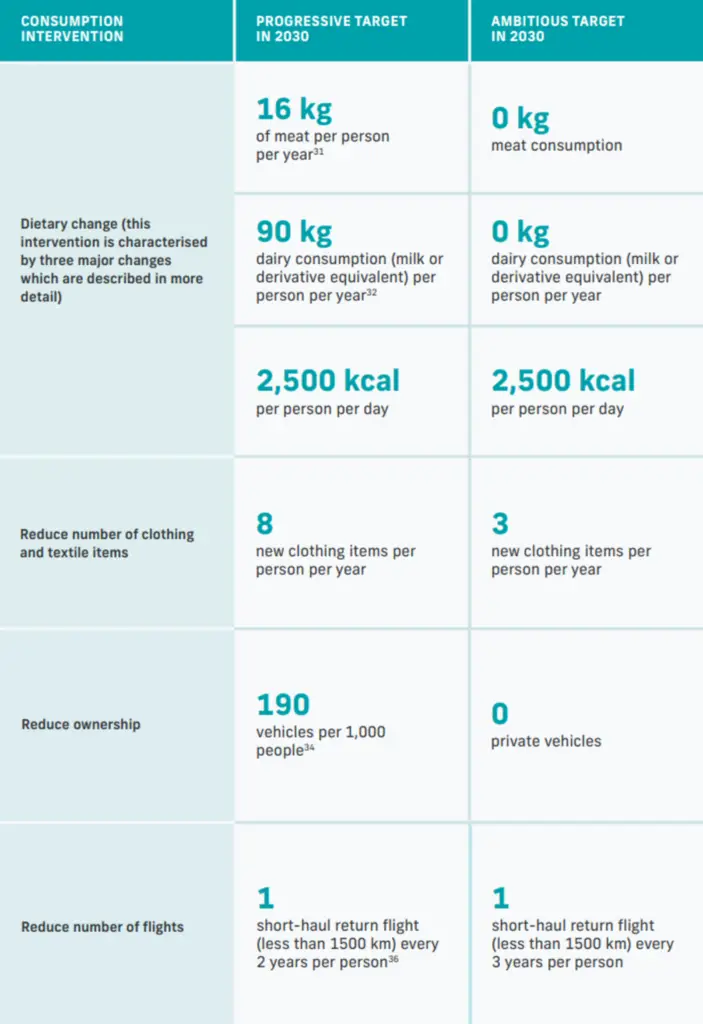Over the past few decades, concerns about the environment and sustainability have been driving significant shifts in public policy and personal habits. However, the recent actions taken by 14 major US cities have left many questioning the extent to which individual freedoms and choices are being sacrificed in the name of environmental conservation.
In a sweeping and alarming agreement, these cities have pledged to implement a series of drastic measures that will undoubtedly reshape the way residents live, work, and navigate their daily lives.
From banning staple dietary choices like meat and dairy to imposing restrictions on personal vehicle ownership, air travel, and even purchasing new clothing, the vision these cities have for a ‘greener’ future raises important questions about the balance between ecological responsibility and individual autonomy.
As the year 2030 looms as the deadline for these changes, it’s essential to critically examine the potential consequences and unintended outcomes of these well-intentioned yet controversial measures.
Fourteen major American cities have embarked on a controversial journey, signing onto a globalist climate agreement that envisions a profoundly transformative—and some might argue, dystopian—future for the country.
This ambitious initiative, championed by the C40 Cities Climate Leadership Group, aims to reshape the very fabric of daily life by eliminating meat and dairy consumption, private vehicle ownership, air travel, and even the freedom to buy new clothes.
According to a report by The Federalist, cities such as Austin, Boston, Chicago, and Los Angeles, among others, have all aligned themselves with this vision, pledging to bring about these dramatic changes by the year 2030.
The C40 Cities Climate Leadership Group traces its origins back to 2005 when it was first established by London Mayor Ken Livingston and representatives from 18 global megacities.
Originally known as the C20, the group expanded its reach by merging with the Clinton Climate Initiative a year later. Over the decades, the organization has grown to encompass 96 cities, representing a significant portion of the world’s population and economy.
Currently led by London Mayor Sadiq Khan and backed by former New York City Mayor Michael Bloomberg, the C40’s mission revolves around combating climate pollution—a noble goal, but one that raises serious concerns about the potential ramifications for modern society.

The C40’s ambitious climate objectives are laid out in a 2019 report titled “The Future of Urban Consumption in a 1.5°C World,” which was reaffirmed in 2023. The report sets a bold target of slashing consumption-based carbon emissions by a minimum of 50% by 2030.
To achieve this, the C40 identifies six sectors requiring “rapid action”: food, construction, clothing, vehicles, aviation, and electronics. At the heart of their vision lies a goal that may seem startling to many: achieving “0 kg of meat consumption,” “0 kg of dairy consumption,” “3 new clothing items per year,” “0 private vehicles,” and “1 short-haul return flight (less than 1,500 km) every three years” per person.
Despite mainstream media’s attempts to dismiss these targets as mere aspirations rather than concrete policy recommendations, several C40-affiliated cities across the United States have begun implementing changes in line with this agenda.
Earlier this year, New York City Mayor Eric Adams imposed restrictions on meat and dairy products served in public institutions. Similarly, California has taken a leading role in advocating for electric vehicles.
Meanwhile, in Europe, the UK announced a ban on the sale of new gas vehicles after 2030, and France moved to prohibit short-haul air travel.
Adding to the unease is the support lent to the C40 agenda by the globalist World Economic Forum, which promotes the group’s objectives on its website. The convergence of these influential players raises questions about the broader implications of the C40’s vision and its alignment with the World Economic Forum’s Great Reset concept, where individuals are told they will “own nothing, and be happy.”
The C40 Cities Climate Leadership Group plans to accomplish this vision by 2030. Here Are The Cities That Are Already On Board-
- Austin, TX
- Boston, MA
- Chicago, IL
- Houston, TX
- Los Angeles, CA
- Miami, FL
- New Orleans, LA
- New York City, NY
- Philadelphia, PA
- Phoenix, AZ
- Portland, OR
- San Francisco, CA
- Washington, DC
- and Seattle, WA are all on board.
As the nation hurtles toward the year 2030, the implications of this far-reaching agreement demand careful examination. While environmental responsibility is crucial, the potential impact on personal freedoms and the fabric of society cannot be ignored.
Striking the right balance between ecological preservation and individual autonomy is a challenge that cannot be underestimated.
In the pursuit of a greener future, the 14 major US cities that have signed onto the C40 Cities Climate Leadership Group’s ambitious agenda have set forth a vision that demands scrutiny. While the urgency to address climate change is undeniable, the question remains whether the proposed measures strike an appropriate balance between environmental responsibility and individual liberties.
The C40’s goal of eliminating meat and dairy consumption, private vehicle ownership, air travel, and limiting clothing purchases raises important concerns about the extent to which personal choices are being curtailed in the name of sustainability. As the deadline for these changes looms on the horizon, it is essential to consider the potential unintended consequences of such sweeping mandates.
While some might argue that drastic actions are necessary to avert catastrophic environmental scenarios, others worry that the sacrifice of personal freedoms could lead to an overly controlling and potentially dystopian future. The path to sustainability cannot ignore the need to preserve the diverse tapestry of human choice and autonomy that forms the foundation of democratic societies.
As citizens, policymakers, and global organizations grapple with these complex issues, finding common ground that respects both environmental stewardship and individual agency becomes paramount. The challenge lies in crafting policies that inspire collective action without infringing upon the values that make societies thrive.
In the years ahead, the success of the C40’s agenda will be determined not only by its impact on carbon emissions but also by its implications for personal freedoms and societal well-being. Striking the right equilibrium between environmental protection and individual liberty is a task that requires careful consideration, open dialogue, and a willingness to address the concerns of all stakeholders. Only through thoughtful deliberation and a nuanced approach can a sustainable and just future be realized.
Recommended Reading:
The Key Mistakes That Led To Ravaging Fires in Maui and Now 2,400 Children Are Missing – Who’s To Blame For An Error This Big?
You Won’t Believe How The True Story Of How Wolf Of Wall Street Film Was Funded





